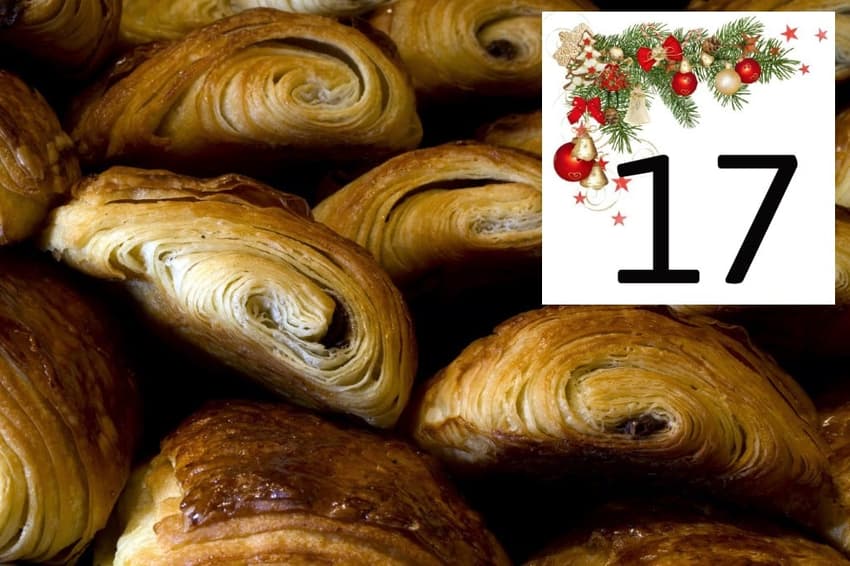This article is part of The Local France's 2020 virtual advent calendar - every day until Christmas we will be presenting you with a person or object that has a particular significance to life in France.
French figures: The most controversial pastry in France

One of the most controversial pastries in France is so delicious that some might say it is in itself a good enough reason to move here.
If you have ever sunk your teeth into a soft, warm pain au chocolat fresh from the oven, you will know what we're talking about.
This exquisite pastry, found in any boulangerie in any French city, town or village (unless they have run out) is arguably one of the major perks of living in France.
But in some French cities, asking for a pain au chocolat could potentially cause a stir.
The reason is that some parts of France staunchly preach a no-pain au chocolat policy. It doesn't mean they don't eat it, they just call it chocolatine instead.
For people who don't understand, it's the biggest war in France.
Pain au Chocolat Vs Chocolatine (= same thing but) pic.twitter.com/Ts7Wjcb9FM
— キョ ☕️ (@kyosein) October 29, 2016
In the southwest, around Bordeaux, some boulangeries seem to take the rivalry so seriously that they charge more for a pain au chocolat than a chocolatine.
Ça déconne pas à #Bordeaux. pic.twitter.com/PIBbPSJhCw
— Popi (@SultanPopi) July 20, 2017
READ ALSO: French pastry wars: Pain au chocolat versus chocolatine
The majority of the French would say pain au chocolat, at least according to one website entirely devoted to the topic.
Although chocolatine-supporters would insist that a pain au chocolat - which directly translates as 'chocolate bread' - looks like this:
Le 5 juin serait-il le début d'une nouvelle guerre ?? Ceci est un pain au chocolat ? pic.twitter.com/KBCUIJWXfx
— KamiFR (@KamiFR_) June 5, 2016
But recently some have pointed out that the "real impostor" was neither of the two French variants, but the American newcomer: the "chocolate croissant".
Oublions notre combat "chocolatine vs pain au chocolat" et concentrons nous sur le véritable imposteur : pic.twitter.com/SvLOutYtzw
— くる • ??????????? (@korewaimouto) December 9, 2020
Comments
See Also
If you have ever sunk your teeth into a soft, warm pain au chocolat fresh from the oven, you will know what we're talking about.
This exquisite pastry, found in any boulangerie in any French city, town or village (unless they have run out) is arguably one of the major perks of living in France.
But in some French cities, asking for a pain au chocolat could potentially cause a stir.
The reason is that some parts of France staunchly preach a no-pain au chocolat policy. It doesn't mean they don't eat it, they just call it chocolatine instead.
For people who don't understand, it's the biggest war in France.
— キョ ☕️ (@kyosein) October 29, 2016
Pain au Chocolat Vs Chocolatine (= same thing but) pic.twitter.com/Ts7Wjcb9FM
In the southwest, around Bordeaux, some boulangeries seem to take the rivalry so seriously that they charge more for a pain au chocolat than a chocolatine.
Ça déconne pas à #Bordeaux. pic.twitter.com/PIBbPSJhCw
— Popi (@SultanPopi) July 20, 2017
READ ALSO: French pastry wars: Pain au chocolat versus chocolatine
The majority of the French would say pain au chocolat, at least according to one website entirely devoted to the topic.
Although chocolatine-supporters would insist that a pain au chocolat - which directly translates as 'chocolate bread' - looks like this:
Le 5 juin serait-il le début d'une nouvelle guerre ?? Ceci est un pain au chocolat ? pic.twitter.com/KBCUIJWXfx
— KamiFR (@KamiFR_) June 5, 2016
But recently some have pointed out that the "real impostor" was neither of the two French variants, but the American newcomer: the "chocolate croissant".
Oublions notre combat "chocolatine vs pain au chocolat" et concentrons nous sur le véritable imposteur : pic.twitter.com/SvLOutYtzw
— くる • ??????????? (@korewaimouto) December 9, 2020
Join the conversation in our comments section below. Share your own views and experience and if you have a question or suggestion for our journalists then email us at [email protected].
Please keep comments civil, constructive and on topic – and make sure to read our terms of use before getting involved.
Please log in here to leave a comment.